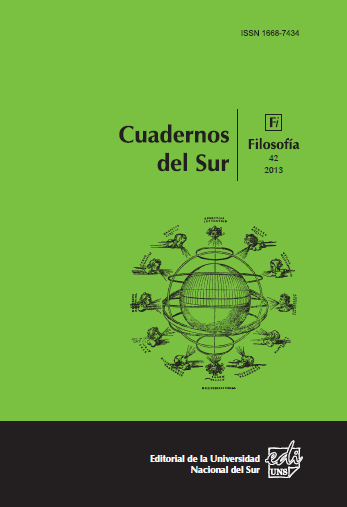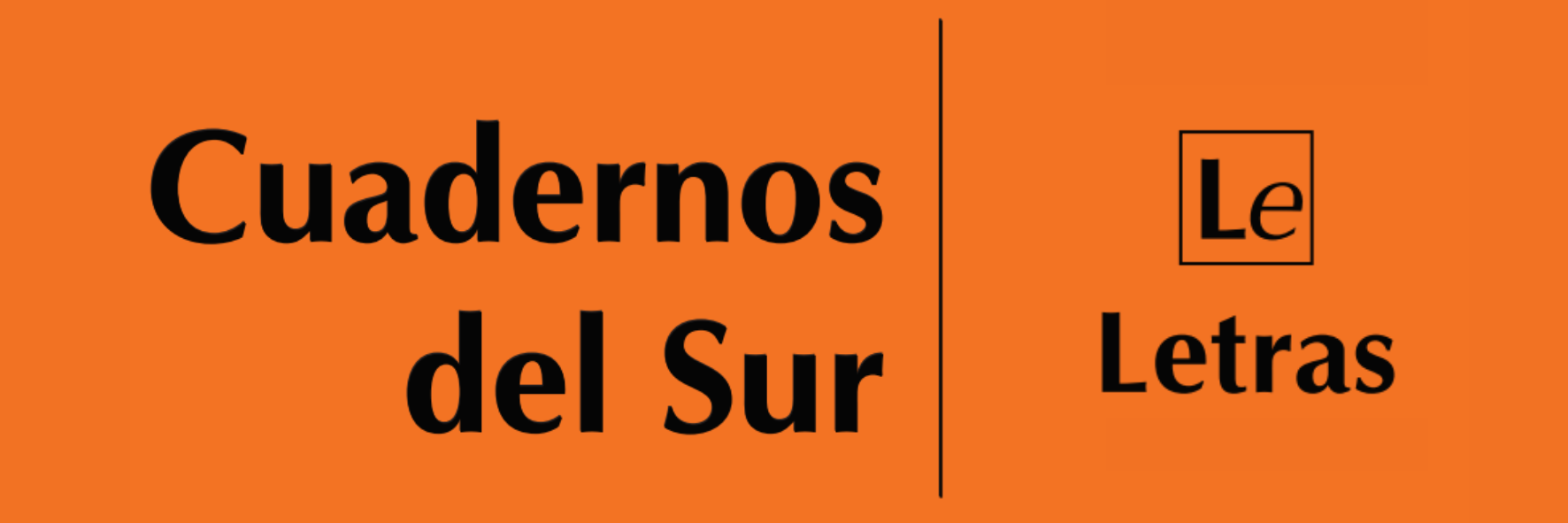Mímesis y pólis: sobre el silencio de Aristóteles y el gesto político de su Poética
Keywords:
Aristotle, Mimesis, PolisAbstract
The aim of this paper is to review the relationship between mímesis and polis from Aristotle’s Poetics. First, I will deal with the arguments that were raised around the silences of this work and that would lead to an eventual apoliticity. Against this position, I will try to show that in the Poetics, Aristotle suggests a political gestureas he emphasized the mimetic learning, which implies consequences for life in the polis.
Downloads
References
Arendt, Hannah (2005), La condición humana, Buenos Aires, Paidós.
Aubenque, Pierre (1981), El problema del ser en Aristóteles, Madrid, Taurus.
----- (1994), “Sí y no”, en Cassin, Bárbara (comp.), Nuestros griegos y sus modernos, Buenos Aires, Manantial, pp. 33-71.
Balot, Ryan (2006), Greek political thought, Malden, Blackwell Publishing.
Barbero, Santiago (2004), La noción de mímesis en Aristóteles, Córdoba, Ediciones del Copista.
Barker, Derek (2009), Tragedy and Citizenship, New York, University of New York Press.
Barnes, Jonathan (1999a), Aristóteles, Madrid, Cátedra.
----- (1999b), The Cambridge companion to Aristotle, Cambridge, Cambridge University Press.
Chantraine, Pierre (1977), Dictionnaire étymologique de la langue grecque. Historie des mots, Paris, Les Editions Klincksieck.
Chichi, Graciela y Suñol, Viviana (2008), “La Retórica y la Poética de Aristóteles: sus puntos de confluencia”, Diánoia, vol. LIII, nº. 60, pp. 79-111.
Derrida, Jacques (2008), Márgenes de la filosofía, Madrid, Cátedra.
Donini, Pierluigi (2003), “Mimesis tragique et apprentissage de la phrónesis”, Les Etudes Philosophiques, n° 67, pp. 436-450.
Düring, Ingemar (2005), Aristóteles. Exposición e interpretación de su pensamiento, México, UNAM.
Easterling, Patricia Elizabeth y Knox, Bernard (eds.) (1990), Historia de la Literatura Clásica. Literatura Griega, Madrid, Gredos, [versión española de F. Zaragosa Alberich].
Else, Gerald (1957), Aristotle’s Poetics: The argument, Cambridge, Harvard University Press.
----- (1986), Plato and Aristotle on Poetry, Chapel Hill, University of North Carolina Press.
Hall, Edith (2003), “Is there a Polis in Aristotle’s Poetics?”, en Silk, M.S. (ed.), Tragedy and the Tragic: Greek Theatre and beyond, Oxford, Clarendon Press, pp. 295-309, [1996].
Halliwell, Stephen (1998), Aristotle’s Poetics, Chicago, University of Chicago Press.
----- (2001), “Aristotelian Mimesis and Human Understanding”, en Andersen, Øivind y Haarberg, Jon (eds.), Making sense of Aristotle. Essays in Poetics, London, Duckworth, pp. 87-107.
Hanink, Johanna (2011), “Aristotle and the tragic theatre in the fourth century B.C.: A response to Jennifer Wise”, Arethusa, vol. 43, pp. 311-328.
Heath, Malcolm (2009), “Should there have been a polis in Aristotle’s Poetics?”, The Classical Quarterly, n° 59, pp 468-485.
Jaeger, Werner (1946), Aristóteles. Bases para la historia de su desarrollo intelectual, México, FCE.
Lesky, Albin (1989), Historia de la literatura griega, Madrid, Gredos.
Liddell, Henry George, Scott, Robert y Jones, Henry Stuart (1940), A Greek-English Lexicon, Oxford, Clarendon Press.
Rhodes, Peter John (2003), “Nothing to do with democracy: Athenian drama and the polis”, Journal of Hellenic Studies, n° 123, pp. 104-119.
Ricœur, Paul (1977), La metáfora viva, Buenos Aires, Ediciones Megápolis, [traducción de G. Baravalle].
Salkever, Stephen (1986), “Tragedy and The Education of the Dêmos: Aristotle’s Response to Plato”, en Euben, J. Peter, Greek tragedy and political theory, California, University of California Press, pp. 274-303.
Suñol, Viviana (2009), “La dimensión política de las artes miméticas en Aristóteles: asimetría entre la Poética y la Política”, en Circe de Clásicos y Modernos 13, pp. 199-212.
----- (2012), Más allá del arte: mímesis en Aristóteles, La Plata, EDULP.
Taminiaux, Jacques (1995), Le théâtre des philosophes. La tragédie, l’être, l’action, Grenoble, Jérôme Millon.
Veloso, Claudio (2005), “Crítica del paradigma interpretativo ‘ético-político’ de la Poética de Aristóteles”, Iztapalapa 58, nº 26, pp. 117-150.
Whitlock Blundell, Mary (1992), “Êthos and dianoia reconsidered”, en Rorty, Amélie Oksenberg (ed.), Essays on Aristotle’s Poetics, New Jersey, Princeton University Press, pp. 155-175.
Will, Frederic (1960), “Aristotle and the Source of the Art-work”, Phronesis, vol. 5, nº 2, pp. 152-168.
Winnington-Ingram, Reginald P. (1990), “Esquilo”, en Easterling, P. E. y Knox, M.W. (eds.), Historia de la Literatura Clásica. Literatura Griega, Madrid, Gredos, pp. 313-327, [versión española de F. Zaragosa Alberich].
Wise, Jennifer (2008), “Tragedy as ‘An Augury of a happy life’”, Arethusa, vol. 41, pp. 381-410.
----- (2013), “Aristotle, actors, and tragic endings: a counter-response to Johanna Hanink”, Arethusa, vol. 46, pp. 117-139.
Downloads
How to Cite
Issue
Section
License
Copyright (c) 2013 Mariana Castillo Merlo

This work is licensed under a Creative Commons Attribution-NonCommercial 4.0 International License.
Aquellos autores/as que tengan publicaciones con esta revista, aceptan los términos siguientes:- Los autores/as conservarán sus derechos de autor y garantizarán a la revista el derecho de primera publicación de su obra, el cuál estará simultáneamente sujeto a la licencia Atribución-No Comercial 4.0 Internacional CC BY-NC 4.0.
- Los autores/as podrán adoptar otros acuerdos de licencia no exclusiva de distribución de la versión de la obra publicada (p. ej.: depositarla en un archivo telemático institucional o publicarla en un volumen monográfico) siempre que se indique la publicación inicial en esta revista.
- Se permite y recomienda a los autores/as difundir su obra a través de Internet (p. ej.: en archivos telemáticos institucionales o en su página web) una vez publicado su trabajo, lo cual puede producir intercambios interesantes y aumentar las citas de la obra publicada. (Véase El efecto del acceso abierto).














